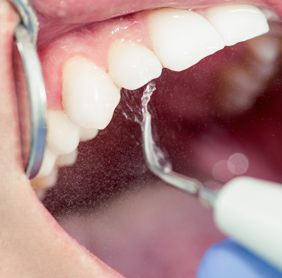Warren’s Sparkle Dental has the Specialty to Diagnose and Treat Periodontal Disease
 What is Periodontics?
What is Periodontics?
Periodontics is a highly specialized area of dentistry that treats the area “around” a tooth, including gums, bone and supporting ligaments. Most common periodontal services consist of scaling and root planning (“deep cleaning”), crown lengthening and dental implants. For periodontal disease treatment, we have many dedicated periodontal specialists (or periodontists) who specialize in the diagnosis and treatment of periodontal disease and other conditions.
How can you be affected by Periodontal Disease?
Periodontal disease is a bacterial infection of the gums and bone that if not treated, can cause you to lose your teeth. Medical research is now showing that these bacteria in your mouth can also travel through your bloodstream into other organs in the body.
These bacteria have been found to increase the risk and severity of other health-related issues such as:
- Diabetes
- Heart disease and stroke
- Respiratory infections and diseases
- Pre-term and low birth-weight babies
- Osteoporosis
How did I get this?
The earliest form of the disease is gingivitis, where the bacteria irritate the gums and cause them to become inflamed and bleed. If gingivitis is not treated, it can advance to periodontal disease.
You’re not alone. The American Dental Association (ADA) states that nearly 75% of the U.S. adults over age 35 have some form of gum disease.
There are many contributing factors to periodontal disease such as:
- Genetics
- Changes in hormones such as with puberty or pregnancy
- Poor nutrition
- Medications
- Other systemic diseases such as diabetes or heart disease
- Stress
- Habits such as tobacco or excessive alcohol use
- Poor home care
Plaque is the sticky film that covers your teeth and makes them feel “fuzzy.” It can be brushed off or removed from between the teeth with dental floss.
Calculus is plaque that has remained on the tooth surfaces and has become hardened. It needs to be removed professionally by your dentist or hygienist using dental instruments, called scalers.
What are the symptoms of Periodontal Disease?
Some common symptoms of periodontal disease are:
- Red, puffy or bleeding gums
- Foul odor or taste in your mouth
- Loose or shifting teeth
- Gums that recede, or shrink, and make the teeth appear longer
Do you have bleeding gums?
Healthy gums do not bleed, even during the dental hygiene appointment. Loaded with bacteria, the plaque and calculus can cause an infection where the first sign is bleeding gums. Periodontal disease doesn’t typically hurt until it is in the advanced stages. Bleeding is the body’s way of indicating that something is wrong.
Identifying Periodontal Disease
We do a comprehensive exam. This includes periodontal charting, where we take measurements and record the spaces or “pockets” in between your teeth and gums. In healthy gums, the pockets measure 1 to 3 millimeters in depth, and there is no bleeding. Deeper measurements or pockets that bleed indicate a problem. We look for bone loss on your x-rays, and we note any loose and missing teeth or areas where your gums have receded. Bone is the stable support for your teeth. The infection causes the bone to shrink, leaving the teeth to become loose.
Are you at risk of Periodontal Disease?
You may be at risk for periodontal disease, the #1 cause of adult tooth loss.
To find out if you’re at risk, please check off all the disease indicators that apply to you.
- Do you smoke?
- Do you have diabetes?
- Is your diet low in important nutrients?
- Are you currently taking any medications such as heart medications, antidepressants, or oral contraceptives?
- Are you pregnant?
- Do any family members have gum disease?
- Do you have bad breath?
- Do you grind or clench your teeth?
- Are you under a great deal of stress?
- Are your gums red and swollen?
- Do your gums bleed when brushing of flossing?
- Are your gums pulling away from your teeth and receding?
- Do you have teeth that appear to be loosening?
- Have you noticed a change in the way your teeth fit together?
- Have you recently lost any teeth?



